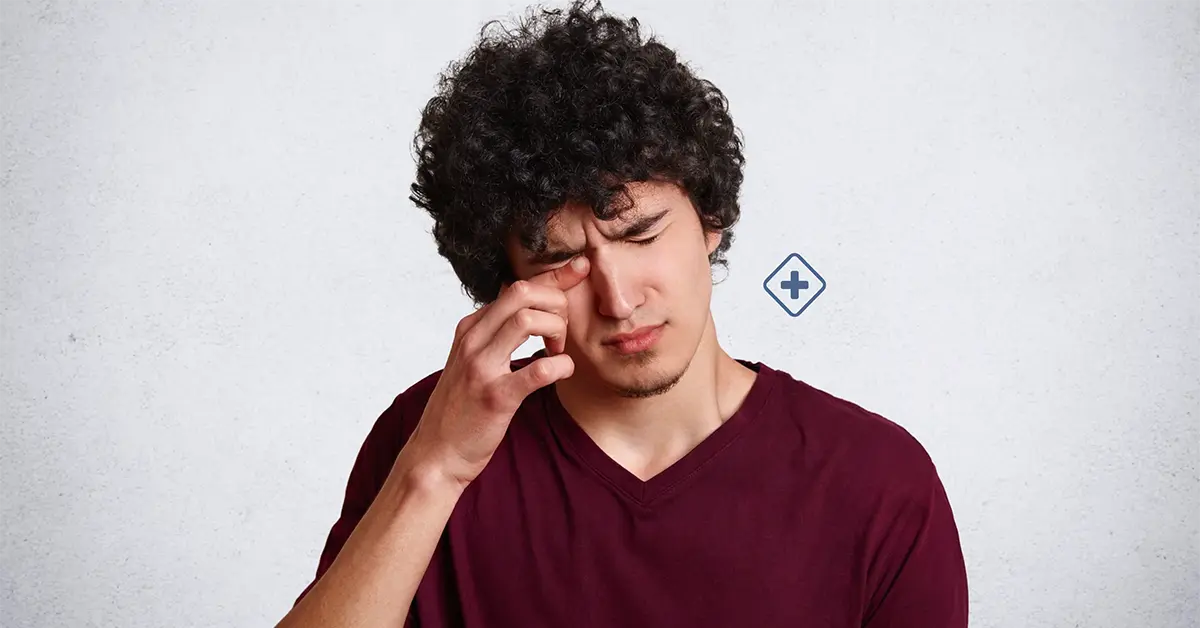
Conjunctivitis
Conjunctivitis is an inflammation or infection of the conjunctiva of the eye.

Conjunctivitis is an inflammation or infection of the conjunctiva of the eye. The eye's conjunctiva is a thin, almost transparent tissue covering the white part of the eye and surrounds the inside of the eyelid. The conjunctiva protects our eyeballs from external factors by acting as an immunological defense for our eyes. Likewise, it helps to lubricate the eyeball, intervening in the formation of tear components (although it intervenes in a smaller quantity than the lacrimal glands).
The pathology that most frequently affects the conjunctiva is Conjunctivitis. When the tiny blood vessels in the eye membrane become inflamed, they become more visible so that the eye may look red or pink, swollen, irritated, and there may even be mucus.
Causes of Conjunctivitis
The most common causes of Conjunctivitis are:
-
Virus: is the most common cause of an infectious type of Conjunctivitis. This type of Conjunctivitis is contagious and can spread quickly from one person to another. For example, children suffer a lot from this type of Conjunctivitis because it tends to spread rapidly in daycare centers and schools.
In some cases, it can be caused by herpes simplex virus, shingles, and other viruses, including the virus that causes VID-19 disease.
-
Bacteria: Bacterial Conjunctivitis is caused by bacteria and usually affects both eyes.
-
Allergies: Allergic Conjunctivitis occurs in response to an allergy-causing substance, such as pollen. This allergic response affects both eyes.
-
Eye irritants such as chemicals, smoke, and chlorine from swimming pools
-
An element or foreign body in the eye
-
In newborn babies, it may be due to a blocked tear duct
Diagnosis:
In most cases, your Ophthalmologist can diagnose conjunctivitis by asking questions about your signs, symptoms, and recent medical history.
When there are severe symptoms or if your answers indicate that your Conjunctivitis is high risk (for example, caused by a sexually transmitted infection, a severe bacterial infection, or a foreign agent in the eye), your Ophthalmologist may request samples of the fluid draining from the eye for lab testing.
Signs and Symptoms of Conjunctivitis:
The most common signs and symptoms that people with Conjunctivitis may
The following are some of the experiments:
-
Itching or burning sensation in one or both eyes
-
Redness in one or both eyes
-
Swollen Eyelids
-
Increased light sensitivity
-
Tears
-
Sandy feeling in one or both eyes
-
Sometimes secretions may stick to the eyelids when you wake up in the morning
Treatment
When you care for yourself to prevent the spread of Conjunctivitis and do everything your Ophthalmologist recommends, Conjunctivitis usually goes away without a problem in the long run.
-
For Conjunctivitis caused by bacterial infection, the symptoms will probably begin to disappear within a few days with an antibiotic. Antibiotics are the most common method of treatment. Adults often prefer eye drops. However, the ointment may be a better option for children because it is easier to apply.
-
When it comes to allergic Conjunctivitis, first of all, you must avoid contact with the external agent that causes the allergy (dust, pollen, pets, etc.) In this case, you should not rub your eyes, and your doctor will probably suggest artificial tears and some antihistamine to stop the inflammation.
-
Regarding Viral Conjunctivitis, Most cases are mild, and the infection goes away on its own in 7-14 days. Your Ophthalmologist may prescribe an antiviral medication for more severe cases (such as those caused by the herpes virus).
Prevention of the spread of Conjunctivitis
Conjunctivitis caused by a virus or bacteria is highly contagious and spreads quickly. If, after touching your infected eye, you touch your other eye or an object or try on lenses while you still have traces of the infected fluid that came out of your eye, you may be spreading the virus or bacteria that caused the Conjunctivitis.
Use the following tips to prevent the spread of Conjunctivitis:
-
Wash your hands thoroughly with soap and water frequently (especially after eye medication)
-
Avoid touching your eyes or face with your hands
-
Use a clean towel or cloth every day to dry your face
-
Avoid sharing towels, pillows, or handkerchiefs
-
Change your pillowcase frequently
-
After learning you have Conjunctivitis, discard and replace all eye makeup products such as mascara or eye pencil
-
Avoid sharing your makeup
-
Do not share a lens case or contact lens solution
-
Ask your Ophthalmologist about contact lens instructions
Can I go to school or work with Conjunctivitis?
If your child has conjunctivitis, it's good to keep him/her out of school for a day or two to prevent its spread.
If you have Conjunctivitis and you can't take a break from work or school to rest, keep in mind that Conjunctivitis is no more contagious than the common cold; however, it's crucial to be conscious of this, take extreme precautions (following the prevention tips above), and maintain excellent hygiene.
Health Library
Ophthalmology

- Do You Need an Appointment with a Specialist?
- call us
- write us
- let's talk

